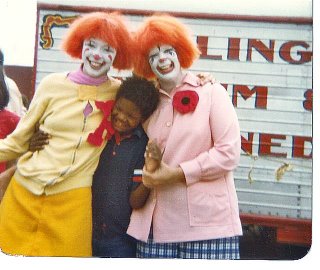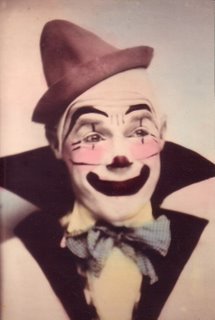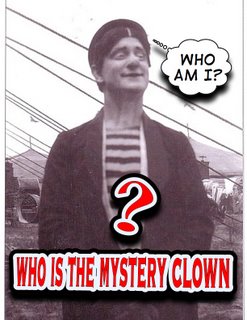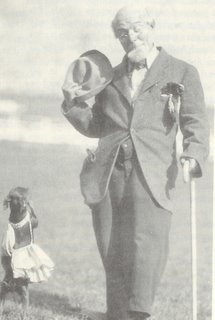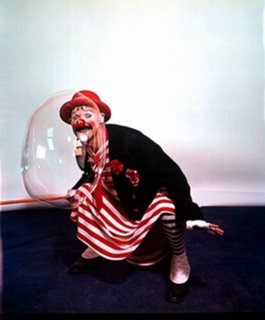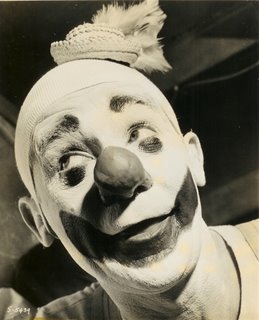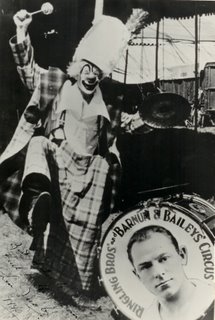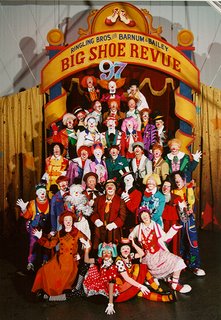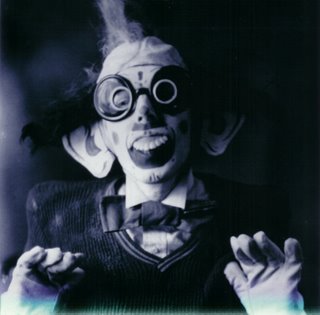My friend Dave Carlyon, author of the book Dan Rice: The Most Famous Man You've Never Heard Of ( http://www.amazon.com/Dan-Rice-Famous-Youve-Heard/dp/1891620576/sr=1-1/qid=1157025844/ref=pd_bbs_1/103-9096260-2226237?ie=UTF8&s=books ) weighs in with more information on last week's post regarding George L. Fox...
_______________________________________________________________
Pat,
The site is terrific. Thanks for putting so much into it.
George L. Fox was a clown star whose image became very well known, and deserves our attention. However the info you pass on contains some errors and stretched interpretation.
Fox couldn't introduce violent slapstick or topical satire to America because they are ancient techniques, often employed. Slapstick before and after Fox clattered in a long line of violent comedy. As for topical satire, it was as old as Greek plays and as recent (before Fox) as 1850s America when it reached a peak of popularity in talking clown Dan Rice, whose spoken and sung "hits on the times" could be much more pointed than Fox's pantomime.
To label Fox "America's First Great Whiteface Clown" means ignoring that nearly all clowns then were whiteface, with great clowns before him. (Considering the clowns of minstrelsy, it's more accurate to say that all clowns were whiteface or blackface.) In the 1800s stage clowns vied for attention with circus clowns, while the leading circus clowns also appeared in winter all-star circuses in big city theaters. (Fox at Barnum's American Museum had nothing to do with circus, because it was strictly a stage show. Barnum had virtually no connection to circus till he was in retirement, when circus men approached him for the use of his name in what would become "Barnum & Bailey".)
The claim for Fox's pioneering role partly relies on our age's bias that 19th-century performing was excessive, full of waving arms and wild faces, needing the "reform" of quieter performers. Fox's silence fits the presumed "reform". However this bias ignores the historical fact of quiet subtlety in earlier performances, and the psychological fact that each age sees itself as an improvement on older ages. (Notice the same bias slapped on circus clowns, that all we do is "cavort" in arm-waving, mugging "antics".)
A related suggestion has been made that an American style of underplaying originated in Fox's deadpan. Any claim that someone pioneered an "American style" of anything is an attention-grabber but usually omits contemporaries and predecessors. As a historian and a performer, I ran across much comedy before Fox that wouldn't have worked without underplaying and deadpan.
Much of the praise comes from "The Age and Stage of George L. Fox" by Laurence Senelick. Though I hesitate to contradict Senelick, a brilliant performance scholar, I believe he made too much of Fox.
Fox's influence is questionable. Though his image became widely known, very few audiences or performers across the country ever saw him perform because he starred mostly in New York, then only one of many centers of performance (Boston, Chicago, New Orleans, etc.). However his NYC base boosted his retroactive stature, for reasons having nothing to do what his clowning. First, our age's New York-centric bias sees NYC performers, present and past, at a pinnacle. Second, as a practical matter of historical research, scholars can access archives in New York easier, making it more likely they'll feature New York-based performers like Fox. Adding to his retroactive appeal is the same romantic allure of James Dean or Janis Joplin, that they, like Fox, died young.
Hope this helps.
Dave
**********************
David Carlyon, CC '76 [and Ph.D. '93]
www.DavidCarlyon.net
